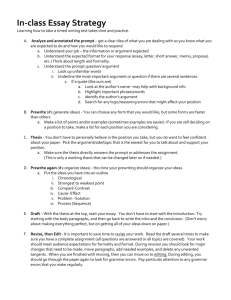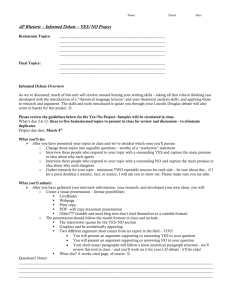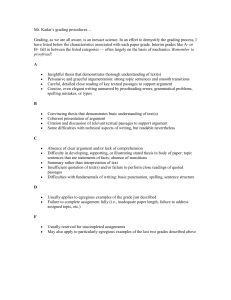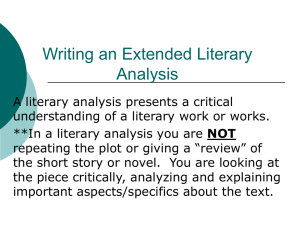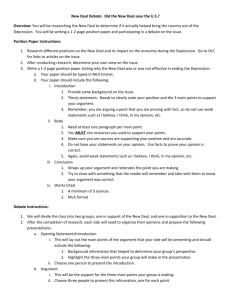Syllabus - College Writing 2
advertisement
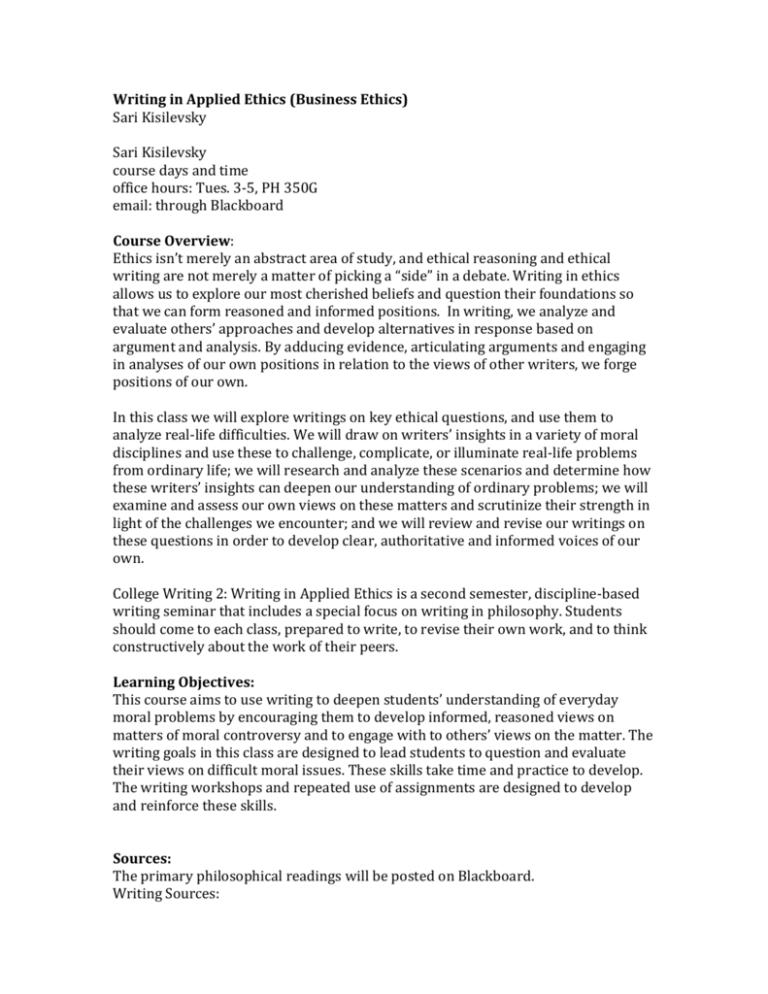
Writing in Applied Ethics (Business Ethics) Sari Kisilevsky Sari Kisilevsky course days and time office hours: Tues. 3-5, PH 350G email: through Blackboard Course Overview: Ethics isn’t merely an abstract area of study, and ethical reasoning and ethical writing are not merely a matter of picking a “side” in a debate. Writing in ethics allows us to explore our most cherished beliefs and question their foundations so that we can form reasoned and informed positions. In writing, we analyze and evaluate others’ approaches and develop alternatives in response based on argument and analysis. By adducing evidence, articulating arguments and engaging in analyses of our own positions in relation to the views of other writers, we forge positions of our own. In this class we will explore writings on key ethical questions, and use them to analyze real-life difficulties. We will draw on writers’ insights in a variety of moral disciplines and use these to challenge, complicate, or illuminate real-life problems from ordinary life; we will research and analyze these scenarios and determine how these writers’ insights can deepen our understanding of ordinary problems; we will examine and assess our own views on these matters and scrutinize their strength in light of the challenges we encounter; and we will review and revise our writings on these questions in order to develop clear, authoritative and informed voices of our own. College Writing 2: Writing in Applied Ethics is a second semester, discipline-based writing seminar that includes a special focus on writing in philosophy. Students should come to each class, prepared to write, to revise their own work, and to think constructively about the work of their peers. Learning Objectives: This course aims to use writing to deepen students’ understanding of everyday moral problems by encouraging them to develop informed, reasoned views on matters of moral controversy and to engage with to others’ views on the matter. The writing goals in this class are designed to lead students to question and evaluate their views on difficult moral issues. These skills take time and practice to develop. The writing workshops and repeated use of assignments are designed to develop and reinforce these skills. Sources: The primary philosophical readings will be posted on Blackboard. Writing Sources: Gordon Harvey, A Brief Guide to the Elements of the Academic Essay Michael Harvey, The Nuts and Bolds of College Writing Evaluation: Assignments: 4 x 10% each, for a total of 40% Draft Assignments: 5 x 2% each, for a total of 10% Self-Evaluation of Drafts: 5 x 2% each, for a total of 10% Peer-Evaluations of Drafts: 5x 2% each, for a total of 10% Reading Questions: 20 x 1% each, for a total of 20% Class Participation: 10% Course Policies: Submission of Work: 1. All submitted work is formal written scholarship. It must include your name and class number, and an appropriate title. Your work must be written in full, grammatically well-formed sentences. Multiple pages must be stapled together. Footnotes or endnotes must be properly formatted, including full references and pinpoint citations. 2. All use of materials that do not come directly from your head needs to be properly cited. Failure to fully cite all material used constitutes an academic offence and will be treated as such. For more information about citation formats, consult the Queens College Writing Center, or the Purdue Online Writing Lab (available online). For information about what constitutes an academic offence, see the College Bulletin. 3. The only excuses for a late assignment are illness or emergency. You must provide official documentation for this (a doctor’s note or a letter from the registrar) specifying that you could not fulfill your work requirements on the dates that they were due. You do not need to include your reasons for lateness; you are entitled to your privacy on this. Late assignments submitted without official documentation will be docked 2% per day. 4. In-class participation: There is a very heavy emphasis on discussion in this class. You are expected to come to class prepared and participate in class discussions. I will often call names off the roster. Classroom and Online Environment: There is a lot of discussion of controversial issues in this class. The classroom is like any other professional environment. You should always maintain a professional attitude towards others. This includes: 1. Making sure that your cell phones are off before you enter class. 2. Paying attention when other people are talking. This means no texting, emailing, surfing the internet, or playing games during class. 3. Not interrupting other people when they are speaking. 4. Use of respectful language: no slurs, no swearing, and avoiding stereotypes. 5. Treating your fellow students with respect even when you disagree. Schedule of Classes: 1. Introduction: What is Ethics? What isn’t Ethics? Writing in Applied Ethics. Section I: Duties to Others 2. Lesson Plan: Identifying An Author’s Conclusion and Locating a Position Within a Debate Reading: Singer, “Rich and Poor” 3. Lesson Plan: Identifying an Author’s Argument Reading: Singer, “Rich and Poor” Vaughan, Introduction to Arguments 4. Lesson Plan: Evaluating an Author’s Argument Reading: Singer, “Rich and Poor” 5. Lesson Plan: Writing Workshop: Case Studies: Formulating a Research Question (simple version) Reading: Singer, “Rich and Poor” GivingWhatWeCan.org 6. Lesson Plan: Writing Workshop: Developing a Point of View (Thesis) and Locating it Within a Debate Reading: Gordon Harvey, Thesis, Motive Nuts and Bolts, The Beginning Toby Ord, “The Moral Imperative Towards Cost Effectiveness” 7. Lesson Plan: Writing Workshop: Essay Structure Draft of Assignment 1 Due 8. Lesson Plan: Identifying an Author’s Conclusion Reading: Shue, “Negative and Positive Duties” Assignment 1 Due 9. Lesson Plan: Evaluating an Author’s Argument Reading: Shue, “Negative and Positive Duties” 10. Lesson Plan: Writing Workshop: Case Studies & Developing a Point of View (Thesis) Reading, Ponting, “Creating the Third World” 11. Lesson Plan: Identifying an Author’s Conclusion Reading, Hart, “Tracing Consequences” 12. Lesson Plan: Evaluating an Author’s Argument Reading, Hart, “Tracing Consequences” 13. Lesson Plan: Identifying an Author’s Conclusion Reading: Schulz, “Trading With Abusive Regimes” 14. Lesson Plan: Case Studies & Introduction to Sources: Formulating and Researching a Research Question (Library Visit) (Responsibilty) Reading: Nuts and Bolts: The Beginning & Searches 15. Lesson Plan: Gathering and Using Sources (Library Visit) 16. Lesson Plan: Writing Workshop: Thesis, Motive & Structure Draft of Assignment 2 Due Section II: Respect for Persons 17. The Ford Pinto: contrast with Singer Assignment 2 Due 18. Kant, The Groundwork of the Metaphysics of Morals 19. Kant, cont’d: the significance of choice (as compared to forcing) Section III: Exploitation and Manipulation 20. Frontline, “The Card Game” 21. Lesson Plan: Identifying An Author’s Conclusion and Locating a Position Within a Debate Reading: Feinberg, “Non-Coercive Exploitation” 22. Lesson Plan: Evaluating an Author’s Argument Reading: Feinberg, “Non-Coercive Exploitation” 23. Lesson Plan: Writing Workshop: Case Study: Formulating a Research Question (Exploitation) 24. Lesson Plan: Writing Workshop (Thesis, Motive & Structure) Draft of Assignment 3 Due 25. Lesson Plan: Identifying An Author’s Conclusion and Locating a Position Within a Debate Reading, Buss, “Valuing Autonomy:” (compare manipulation and deception to exploitation) Assignment 3 Due 26. Lesson Plan: Identifying an Author’s Conclusion Readings: Goldman Sachs 27. Lesson Plan: Writing Workshop: Developing a Point of View (Thesis) and Locating it Within a Debate 28. Lesson Plan: Writing Workshop (Thesis, Motive, Structure and Evidence) Draft of Assignment 4 Due Assignment 4 Due
